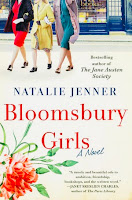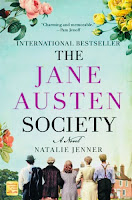One of the joys of reading is discovering new authors who seem to know exactly the charming type of story you need to dive into right now and a couple of years ago, Natalie Jenner’s The Jane Austen Society did just that for me.
It’s a delightful fictional look at the possible origins of a group devoted to preserving the Chawton home of Jane Austen and bringing more attention to her wonderful books(highly recommend it!) but today, I am here to share with you all my delight with her fabulous follow-up,Bloomsbury Girls , on this book blog tour.
While there is one character from The Jane Austen Society included here, you can enjoy this novel first on it’s own engaging merits. The ladies of the title work together at Bloomsbury Books in post WWII London , a rather new development for the shop that has long been run by men.
In this except from the novel, you can meet all three of them; Vivien whose rivalry with co-worker Alec is more than professional, Grace, a busy mother and wife hoping to do more with her love of books and Evie, the new girl looking for a change of scene and getting more than she ever expected:
Excerpt from Chapter Two of Bloomsbury Girls,
by Natalie Jenner
The Tyrant was Alec McDonough, a bachelor in his early thirties who ran the New Books, Fiction & Art Department on the ground floor of Bloomsbury Books. He had read literature and fine art at the University of Bristol and been planning on a career in something big—Vivien accused him of wanting to run a small colony—when the war had intervened.
Following his honourable discharge in 1945, Alec had joined the shop on the exact same day as Vivien. “By an hour ahead. Like a dominant twin,” she would quip whenever Alec was rewarded with anything first.
From the start Alec and Vivien were rivals, and not just for increasing control of the fiction floor. Every editor that wandered in, every literary guest speaker, was a chance for them to have access to the powers that be in the publishing industry. As two secretly aspiring writers, they had each come to London and taken the position at Bloomsbury Books for this reason.
But they were also both savvy enough to know that the men in charge—from the rigid Mr. Dutton and then-head-of-fiction Graham Kingsley, to the restless Frank Allen and crusty Master Mariner Scott—were whom they first needed to please. Alec had a clear and distinct advantage when it came to that. Between the tales of wartime service, shared grammar schools, and past cricket-match victories, Vivien grew quickly dismayed at her own possibility for promotion.
Sure enough, within weeks Alec had quickly entrenched himself with both the long-standing general manager, Herbert Dutton, and his right-hand man, Frank Allen. By 1948, upon the retirement of Graham Kingsley, Alec had ascended to the post of head of fiction, and within the year had added new books and art to his oversight—an achievement which Vivien still referred to as the Annexation.
She had been first to call him the Tyrant; he called her nothing at all. Vivien’s issues with Alec ranged from the titles they stocked on the shelves, to his preference for booking events exclusively with male authors who had served in war. With her own degree in literature from Durham (Cambridge, her dream university, still refusing in 1941 to graduate women), Vivien had rigorously informed views on the types of books the fiction department should carry. Not surprisingly, Alec disputed these views.
“But he doesn’t even read women,” Vivien would bemoan to Grace, who would nod back in sympathy while trying to remember her grocery list before the bus journey home. “I mean, what—one Jane Austen on the shelves? No Katherine Mansfield. No Porter. I mean, I read that Salinger story in The New Yorker he keeps going on about: shell-shocked soldiers and children all over the place, and I don’t see what’s so masculine about that.”
Unlike Vivien, Grace did not have much time for personal reading, an irony her husband often pointed out. But Grace did not work at the shop for the books. She worked there because the bus journey into Bloomsbury took only twenty minutes, she could drop the children off at school on the way, and she could take the shop newspapers home at the end of the day. Grace had been the one to suggest that they also carry import magazines, in particular The New Yorker. Being so close to the British Museum and the theatre district, Bloomsbury Books received its share of wealthy American tourists. Grace was convinced that such touches from home would increase
their time spent browsing, along with jazz music on the wireless by the front cash, one of many ideas that Mr. Dutton was still managing to resist.
Vivien and Alec had manned the ground floor of the shop together for over four years, circling each other within the front cash counter like wary lions inside a very small coliseum. The square, enclosed counter had been placed in the centre of the fiction department in an effort to contain an old electrical outlet box protruding from the floor.
Mr. Dutton could not look at this eyesore without seeing a customer lawsuit for damages caused by accidental tripping. Upon his promotion to general manager in the 1930s, Dutton had immediately ordained that the front cash area be relocated and built around the box.
This configuration had turned out to be of great benefit to the staff. One could always spot a customer coming from any direction, prepare the appropriate response to expressions ranging from confused to hostile, and even catch the surreptitious slip of an unpurchased book into a handbag. Other bookshops had taken note of Bloomsbury Books’ ground-floor design and started refurbishing their own.
The entire neighbourhood was, in this way, full of spies. Grace and Vivien were not the only two bookstore employees out and about, checking on other stores’ window displays. London was starting to boom again, after five long years of postwar rationing and recovery, and new bookshops were popping up all over. Bloomsbury was home to the British Museum, the University of London, and many famous authors past and present, including the prewar circle of Virginia Woolf, E. M. Forster, and Lytton Strachey. This made the district a particularly ideal location for readers, authors, and customers alike.
And so, it was here, on a lightly snowing day on the second of January, 1950, that a young Evie Stone arrived, Mr. Allen’s trading card in one pocket, and a one-way train ticket to London in the other.
Excerpt courtesy of St. Martin’s Press, New York. Copyright © 2022 by Natalie Jenner. All rights reserved.




1 comment:
Thanks for sharing the excerpt, Tara. I like how you connected Shop Around the Corner and Charring Cross Road to Bloomsbury Girls. Two favorite movies paired with a favorite book.
Post a Comment